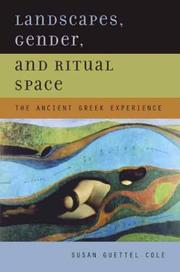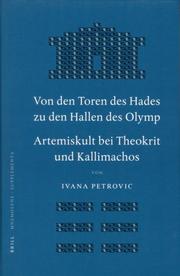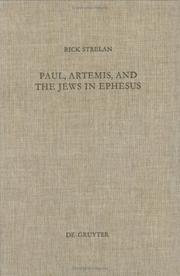| Listing 1 - 8 of 8 |
Sort by
|
Book
ISBN: 9782875622723 2875622722 Year: 2021 Volume: 37 Publisher: Liège Presses universitaires de Liège
Abstract | Keywords | Export | Availability | Bookmark
 Loading...
Loading...Choose an application
- Reference Manager
- EndNote
- RefWorks (Direct export to RefWorks)
Au sein des plus grands sanctuaires d'Apollon, une place est dévolue à Artémis : elle y reçoit un culte et possède souvent son propre temple. Le mythe de la naissance des jumeaux divins explique en partie cet appariement, mais ne suffit pas à rendre compte de la place et de la fonction réservées à la déesse dans ces lieux sacrés. Dans le tandem qu'elle forme avec son frère là où il règne en maître, quel est le rôle assumé par Artémis ? Cette question est au cœur du présent ouvrage, qui rassemble systématiquement les documents archéologiques et textuels disponibles sur les sites de Délos, de Delphes, de Claros et de Didymes. Leur confrontation critique éclaire la place et le rôle spécifique de la déesse d'un sanctuaire à l'autre. Près d'Apollon et souvent dans son ombre, Artémis semble avoir été un rouage essentiel dans l'articulation des pratiques locales avec les cultes panhelléniques. Attirant une clientèle très diverse par ses origines géographiques, son statut social et son genre, la déesse a été impliquée à différents titres et avec une intensité variable dans la vie des cités qui géraient ces sanctuaires. Sa position secondaire par rapport à son jumeau lui a conservé une plasticité qui a favorisé l'évolution de son culte au plan local.
Artemis --- Cult --- Cults. --- Greece --- Turkey --- Artemis - (Greek deity) - Cult - Greece - Delos Island --- Artemis - (Greek deity) - Cult - Greece - Delphoi --- Artemis - (Greek deity) - Cult - Turkey - Claros Site --- Artemis - (Greek deity) - Cult - Turkey - Didyma (Extinct city) --- Artemis - (Greek deity)
Book
ISBN: 9789607036070 9607036077 Year: 1991 Volume: 115 Publisher: Athēnai : Athēnais Archaiologikē Hetaireia,
Abstract | Keywords | Export | Availability | Bookmark
 Loading...
Loading...Choose an application
- Reference Manager
- EndNote
- RefWorks (Direct export to RefWorks)
Terra-cotta sculpture, Greek --- Pottery, Greek --- Artemis (Greek deity) --- Terres cuites grecques --- Céramique grecque --- Artémis (Divinité grecque) --- Cult --- Art --- Culte --- Excavations (Archaeology) --- Céramique grecque --- Artémis (Divinité grecque) --- Artemis (Greek deity) - Cult --- Excavations (Archaeology) - Greece - Piraeus
Book
ISBN: 9783900305369 3900305366 Year: 2001 Volume: 37 Publisher: Wien Österreichisches archäologisches Institut
Abstract | Keywords | Export | Availability | Bookmark
 Loading...
Loading...Choose an application
- Reference Manager
- EndNote
- RefWorks (Direct export to RefWorks)
Excavations (Archaeology) --- Artemis (Greek deity) --- Fouilles (Archéologie) --- Artémis (Divinité grecque) --- Art --- Temple of Artemis (Ephesus) --- Ephesus (Extinct city) --- Ephèse (Ville ancienne) --- Buildings, structures, etc. --- Religion. --- Constructions --- Religion --- Goddesses --- Goddesses, Greek --- Cult. --- Fouilles (Archéologie) --- Artémis (Divinité grecque) --- Ephèse (Ville ancienne) --- Artemis (Greek deity) - Cult. --- Goddesses - Turkey - Ephesus (Extinct city). --- Goddesses, Greek - Turkey - Ephesus (Extinct city).

ISBN: 0520235444 9780520235441 Year: 2004 Volume: *5 Publisher: Berkeley University of California press
Abstract | Keywords | Export | Availability | Bookmark
 Loading...
Loading...Choose an application
- Reference Manager
- EndNote
- RefWorks (Direct export to RefWorks)
Women --- Sacred space --- Artemis (Greek deity) --- Religious life --- History --- Cult --- Greece --- Religion --- Femmes --- Lieux sacrés --- Artémis (Divinité grecque) --- History. --- Cult. --- Vie religieuse --- Histoire --- Culte --- Grèce --- Religious life and customs --- Human females --- Wimmin --- Woman --- Womon --- Womyn --- Females --- Human beings --- Femininity --- Holy places --- Places, Sacred --- Sacred places --- Sacred sites --- Sacred spaces --- Sites, Sacred --- Space, Sacred --- Holy, The --- Religion and geography --- Religious life&delete& --- Religious life and customs. --- Women - Religious life - Greece - History --- Sacred space - Greece - History --- Artemis (Greek deity) - Cult --- Greece - Religion

ISBN: 9789004151543 9004151540 9786611926045 1281926043 9047419456 9789047419457 9781281926043 6611926046 Year: 2007 Volume: 281 Publisher: Leiden Brill
Abstract | Keywords | Export | Availability | Bookmark
 Loading...
Loading...Choose an application
- Reference Manager
- EndNote
- RefWorks (Direct export to RefWorks)
This study investigates the reception of contemporary religion in Hellenistic poetry and analyses the treatment of the cult of Artemis—taken as paradigmatic—in Theocritus’ second Idyll and Callimachus’ Hymns . Both Theocritus and Callimachus display a lively interest in contemporary religion in all its facets and each dwells upon an aspect of the cult of Artemis absent in earlier poetry: Theocritus depicts her as a goddess of magic, and Callimachus as a city-goddess. These are precisely the features of her cult that gained prominence in the Hellenistic period. The monograph aims to advance scholarly understanding of the integration and transformation of religious motifs in Hellenistic literature. Die vorliegende Monographie untersucht die Rezeption der zeitgenössischen Religion in der hellenistischen Dichtung, und zwar am Beispiel des Artemiskultes, wie er sich im zweiten Idyll des Theokrit und in den Hymnen des Kallimachos abbildet. Die Analyse zeigt, daß beide Dichter nicht nur großes Interesse an der zeitgenössischen Religion in allen ihren Facetten haben, sondern darüber hinaus jeweils Aspekte des Artemiskultes akzentuieren, die in der hellenistischen Zeit besonders markant sind: Theokrit zeichnet Artemis als eine Göttin der Magie, wogegen Kallimachos Artemis’ Zuständigkeitsbereich ausdifferenziert, wobei er neben der Natur und Jagd vor allem die Stadtgöttin in den Vordergrund stellt. Neben der poetischen Inszenierung der religiösen Phänomene liegt der besondere Schwerpunkt auf der literarischen Umsetzung und neuen Kontextualisierung im Gedichtcorpus.
Artemis (Greek deity) --- Greek poetry, Hellenistic --- Religion and poetry. --- Artémis (Divinité grecque) --- Poésie grecque hellénistique --- Religion et poésie --- Cult. --- History and criticism. --- Themes, motives. --- Culte --- Histoire et critique --- Thèmes, motifs --- Theocritus. --- Callimachus. --- Artemis --- Artémis (Divinité grecque) --- Poésie grecque hellénistique --- Religion et poésie --- Thèmes, motifs --- Religion and poetry --- Poetry and religion --- Poetry --- Hellenistic Greek poetry --- Greek literature, Hellenistic --- Cult --- History and criticism --- Themes, motives --- Religious aspects. --- Artemis (Greek deity) - Cult. --- Greek poetry, Hellenistic - History and criticism. --- Greek poetry, Hellenistic - Themes, motives.
Book
ISBN: 9782869582095 2869582099 Year: 2009 Volume: 21 Publisher: Athènes Ecole française d'Athènes
Abstract | Keywords | Export | Availability | Bookmark
 Loading...
Loading...Choose an application
- Reference Manager
- EndNote
- RefWorks (Direct export to RefWorks)
Cet ouvrage est consacré aux figurines en terre cuite archaïque recueillies entre 1957 et 1985 dans l'Artémision de Thasos, à l'exclusion des protomés féminines qui feront l'objet d'un autre volume des Etudes thasiennes. Le corpus comprend 768 objets qui rendent compte d'un total de 3130 fragments inventoriés après collages. Ces fragments attestent l'existence de près de 300 types techniques dont l'histoire de la production dérivée à Thasos n'a pu être reconstituée que pour un quart d'entre eux. L'étude de cet ensemble permet de cerner le faciès de l'atelier coroplathique thasien : grand centre d'importation et de reproduction, spécialisé dans le surmoulage des figurines ioniennes, il se distingue aussi par la diversité et l'originalité de ses propres créations, d'un éclectisme étonnant. Quant au répertoire iconographique, dominé par les représentations de dames trônant, coiffées du voile et du diadème, il livre des indications précieuses à la fois sur la nature des rituels célébrés dans le sanctuaire et sur les fonctions d'Artémis à Thasos.
Artemis (Greek deity) --- Terra-cotta figurines, Greek --- Terra-cotta sculpture, Greek --- Excavations (Archaeology) --- Handicraft --- Artémis (Divinité grecque) --- Figurines de terre cuite grecques --- Terres cuites grecques --- Fouilles (Archéologie) --- Artisanat --- Cult --- Catalogs --- History --- Culte --- Catalogues --- Histoire --- Sanctuary of Artemis (Thasos Island, Greece) --- Thasos Island (Greece) --- Thãsos (Grèce : Ile) --- Antiquities --- Antiquités --- Votive offerings --- History. --- Artémis (Divinité grecque) --- Fouilles (Archéologie) --- Thásos (Grèce : Ile) --- Antiquités --- Artemis (Greek deity) - Cult - Greece - Thasos Island --- Terra-cotta figurines, Greek - Greece - Thasos Island - Catalogs --- Excavations (Archaeology) - Greece - Thasos Island - Catalogs --- Handicraft - Greece - Thasos Island - History --- Votive offerings - Greece - Thasos Island --- Thasos Island (Greece) - Antiquities - Catalogs

ISBN: 0520929322 9786612356933 1282356933 1597346993 9780520929326 9781597346993 141754502X 9781417545025 0520235444 9780520235441 9781282356931 Year: 2004 Publisher: Berkeley, Calif. University of California Press
Abstract | Keywords | Export | Availability | Bookmark
 Loading...
Loading...Choose an application
- Reference Manager
- EndNote
- RefWorks (Direct export to RefWorks)
The division of land and consolidation of territory that created the Greek polis also divided sacred from productive space, sharpened distinctions between purity and pollution, and created a ritual system premised on gender difference. Regional sanctuaries ameliorated competition between city-states, publicized the results of competitive rituals for males, and encouraged judicial alternatives to violence. Female ritual efforts, focused on reproduction and the health of the family, are less visible, but, as this provocative study shows, no less significant. Taking a fresh look at the epigraphical evidence for Greek ritual practice in the context of recent studies of landscape and political organization, Susan Guettel Cole illuminates the profoundly gendered nature of Greek cult practice and explains the connections between female rituals and the integrity of the community. In a rich integration of ancient sources and current theory, Cole brings together the complex evidence for Greek ritual practice. She discusses relevant medical and philosophical theories about the female body; considers Greek ideas about purity, pollution, and ritual purification; and examines the cult of Artemis in detail. Her nuanced study demonstrates the social contribution of women's rituals to the sustenance of the polis and the identity of its people.
Sacred space --- Women --- Holy places --- Places, Sacred --- Sacred places --- Sacred sites --- Sacred spaces --- Sites, Sacred --- Space, Sacred --- Holy, The --- Religion and geography --- Human females --- Wimmin --- Woman --- Womon --- Womyn --- Females --- Human beings --- Femininity --- History. --- Religious life --- Artemis --- Αρτεμις --- أرتميس --- Ārtimīs --- Artemisa --- Artemida --- Артэміда --- Артемида --- Artemiso --- 아르테미스 --- Arŭt'emisŭ --- Artemide --- ארטמיס --- Artemi --- Artemisz --- アルテミス --- Артеміда --- 阿耳忒弥斯 --- A'ertemisi --- Diana --- Cult. --- Greece --- Religious life and customs. --- Artemis (Greek deity) --- Religion. --- Women -- Religious life -- Greece -- History.. --- Sacred space -- Greece -- History.. --- Artemis (Greek deity) -- Cult.. --- Greece -- Religion. --- ancient history. --- ancient law. --- anthropology. --- antiquity. --- arete. --- artemis. --- athenian democracy. --- city states. --- community. --- competition. --- family. --- female body. --- feminism. --- fertility. --- folk religion. --- folklore. --- gender difference. --- gender roles. --- gender. --- greece. --- greek ritual. --- greeks. --- hubris. --- law. --- legal system. --- masculinity. --- mythology. --- nonfiction. --- polic. --- pollution. --- purity. --- religion. --- reproduction. --- rite. --- ritual. --- sacred space. --- sexuality. --- social body. --- tradition. --- violence. --- women. --- womens rituals.

ISBN: 3110150204 3110814897 9783110150209 Year: 1996 Volume: 80 Publisher: Berlin de Gruyter
Abstract | Keywords | Export | Availability | Bookmark
 Loading...
Loading...Choose an application
- Reference Manager
- EndNote
- RefWorks (Direct export to RefWorks)
Jews --- Artemis (Greek deity) --- Cult --- 227*0 --- 902 <392 EFESE> --- -Jews --- -Hebrews --- Israelites --- Jewish people --- Jewry --- Judaic people --- Judaists --- Ethnology --- Religious adherents --- Semites --- Judaism --- Leven van Paulus --- Archeologie--Westelijk Klein-Azië: Troje; Mysië; Frygië; Pergamon; Lydië; Smyrna; Efese; Halicarnassus; Milete; Bithynië; Pisidië; Pamfylië --- -Religion --- Paul the Apostle, Saint --- -Travel --- -Ephesus (Extinct city) --- -Efes (Extinct city) --- Efesos (Extinct city) --- Efsos Harabeleri (Extinct city) --- Ephesos (Extinct city) --- Ephesus (Ancient city) --- Turkey --- Religion --- Antiquities --- -Leven van Paulus --- -902 <392 EFESE> Archeologie--Westelijk Klein-Azië: Troje; Mysië; Frygië; Pergamon; Lydië; Smyrna; Efese; Halicarnassus; Milete; Bithynië; Pisidië; Pamfylië --- 227*0 Leven van Paulus --- Hebrews --- -227*0 Leven van Paulus --- 902 <392 EFESE> Archeologie--Westelijk Klein-Azië: Troje; Mysië; Frygië; Pergamon; Lydië; Smyrna; Efese; Halicarnassus; Milete; Bithynië; Pisidië; Pamfylië --- Paul, --- Pavel, --- Pavol, --- Paulus von Tarsus, --- Paulos, --- Pōghos, --- Paweł, --- Paweł z Tarsu, --- Būlus, --- Pablo, --- Paulo de Tarso, --- Paolo di Tarso, --- Pál, --- Apostolos Paulos --- Saul, --- القديس بولس الرسول --- بولس، --- 사도바울 --- Travel --- Bible. --- Epistles of Paul --- Paul, Epistles of --- Paul Sŏsin --- Pauline epistles --- Risālat al-Qiddīs Būlus al-rasūl al-thāniyah ilá Tīmūthīʼūs --- Criticism, interpretation, etc. --- Ephesus (Extinct city) --- Efes (Extinct city) --- Religion. --- Paulus, --- Pawełm --- Paulo, --- Paolo, --- Artemis --- Αρτεμις --- أرتميس --- Ārtimīs --- Artemisa --- Artemida --- Артэміда --- Артемида --- Artemiso --- 아르테미스 --- Arŭt'emisŭ --- Artemide --- ארטמיס --- Artemi --- Artemisz --- アルテミス --- Артеміда --- 阿耳忒弥斯 --- A'ertemisi --- Diana --- Jews - Turkey - Ephesus (Extinct city) --- Artemis (Greek deity) - Cult - Turkey - Ephesus (Extinct city)
| Listing 1 - 8 of 8 |
Sort by
|

 Search
Search Feedback
Feedback About UniCat
About UniCat  Help
Help News
News